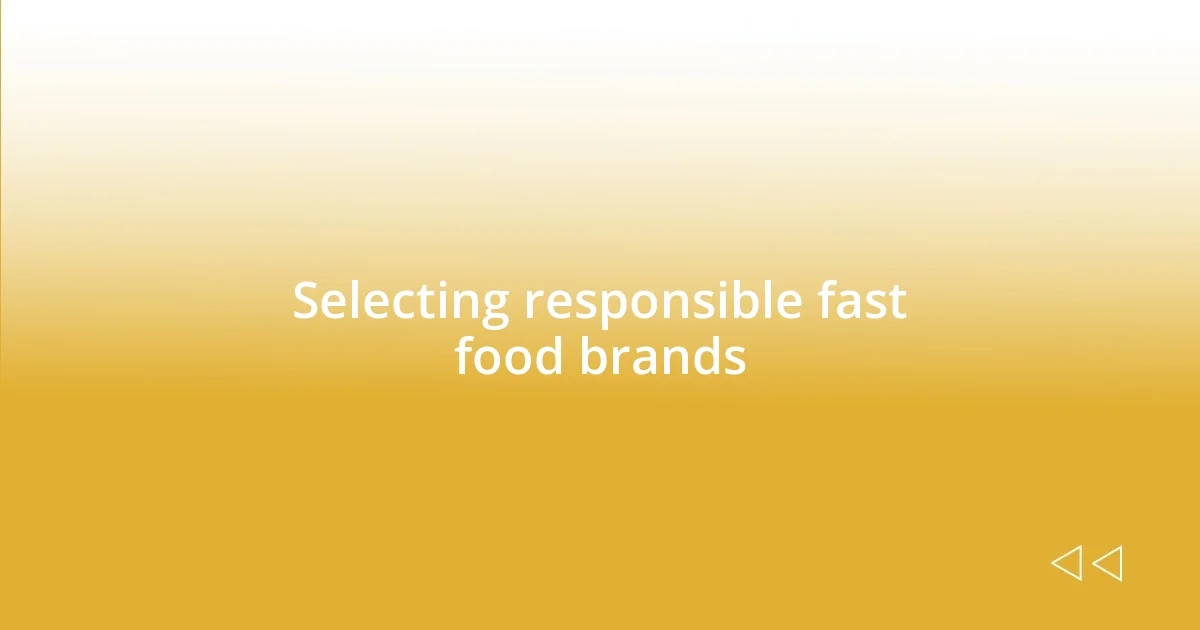Key takeaways:
- Ethical fast food choices involve transparency in ingredient sourcing, animal welfare, and sustainability practices, creating a deeper connection to food.
- Supporting local farms and responsible brands can positively impact local economies and promote environmental sustainability, enhancing consumer fulfillment.
- Informed decisions about menu items and ingredients can lead to healthier choices, aligning dining habits with personal values and environmental concerns.

Understanding ethical fast food choices
When I think about ethical fast food choices, I immediately reflect on the transparency of sourcing ingredients. It’s not just about what’s on my plate but where it comes from. Have you ever paused to consider how many hands have touched your food before it arrives? I recall a time I chose a local burger joint that proudly displayed its farm partnerships. That decision made me feel connected to my meal in a way that fast food chains rarely offer.
I believe that the treatment of animals is a core aspect of ethical food choices. Watching documentaries about factory farming left me feeling troubled and determined to make better choices. It led me to a small chain that emphasizes humane sourcing; knowing that the animals lived healthy lives made every bite feel more intentional. Isn’t it rewarding to support places that align with our values?
Moreover, sustainability plays a significant role in ethical fast food decisions. I remember visiting a restaurant that used compostable packaging, and it struck me as a simple yet powerful gesture towards reducing waste. What if more establishments adopted practices like this? Each choice we make can ripple out and influence the industry. By opting for places committed to eco-friendly practices, we’re not just satisfying hunger but also nurturing the planet.

Selecting responsible fast food brands
When selecting responsible fast food brands, I find it crucial to look for those committed to ethical sourcing. I still remember the delight I felt when I discovered a chain that proudly featured their partnerships with local farms. It opened my eyes to how our choices at the drive-thru can support local economies and reduce carbon footprints. There’s something incredibly fulfilling about knowing that my meal supports farmers in my community.
Additionally, I’ve learned that not all fast food chains treat their employees equally. I recall visiting a spot touted for its fair wages and benefits for staff. The friendly service paired with the knowledge that the workers were treated well made my experience much more enjoyable. Wouldn’t you agree it’s comforting to dine where individuals are valued and respected?
A key indicator of a responsible brand is its transparency. I was pleasantly surprised to encounter a fast food joint that openly shared information about their ingredients and supply chain. It sparked an interesting conversation with the staff about their sourcing practices. It’s the kind of environment where customers can feel informed and empowered, knowing they have a choice in what they support with their dollars.
| Fast Food Brand | Ethical Practices |
|---|---|
| Local Burger Joint | Farm partnerships and local sourcing |
| Humane Sourcing Chain | Emphasis on animal welfare and humane treatment |
| Fair Wage Establishment | Commitment to fair wages and employee benefits |
| Transparency-driven Brand | Clear information on sourcing and ingredients |

Evaluating ingredient sourcing practices
Evaluating ingredient sourcing practices is vital when considering ethical fast food. I remember one afternoon at a taco truck that boasted its use of organic vegetables from a nearby farm. The freshness in each bite was not just a treat for my palate; it felt like a small act of rebellion against the mass-produced items common in larger chains. Knowing that I supported local agriculture made the meal so much more fulfilling.
To truly evaluate a brand’s ingredient sourcing, it helps to consider several factors:
- Local Partnerships: How closely does the restaurant work with local farms?
- Organic Certifications: Are the ingredients certified organic or labeled as non-GMO?
- Seasonal Sourcing: Does the menu adapt to seasonal produce, showcasing what’s fresh and available?
- Traceability: Can the brand trace its ingredients back to their origin?
- Sustainability Practices: Are the sourcing methods environmentally friendly, such as using regenerative farming techniques?
Each of these aspects reveals a deeper layer of responsibility that I value as a consumer. It’s like peeling an onion; the more layers I uncover, the clearer my understanding of that brand’s ethical stance becomes.

Assessing animal welfare standards
When assessing animal welfare standards, my experience tells me that it’s essential to scrutinize how animals are raised and treated. I distinctly remember visiting a farm that supplied a local fast food chain, where the animals roamed freely and seemed genuinely cared for. It struck me how this humane approach not only impacts the animals’ well-being but also enhances the quality of the food they provide. Isn’t it reassuring to know the source of your meal not only looks good but is treated with respect?
I’ve often found myself reflecting on companies that prioritize animal welfare certifications, such as those from Humane Farm Animal Care or the Global Animal Partnership. These labels serve as reliable markers for consumers like us, who wish to ensure that our food choices align with our ethical beliefs. The day I ordered from a restaurant that proudly displayed its commitment to these standards, I felt a sense of pride knowing that my meal supported better practices in the fast food industry.
Furthermore, I think about the stories behind these standards. For example, I once learned about a farm that transitioned to more humane practices after receiving consumer pressure. The owner shared how changing their methods wasn’t just about compliance but about reconnecting with their values and making a difference. It made me realize that as consumers, we wield considerable influence when we demand higher animal welfare standards. Isn’t it empowering to think that our choices can foster positive change in the food system?

Exploring eco-friendly packaging options
Exploring eco-friendly packaging options is something I’ve become increasingly passionate about. I remember the morning when I unwrapped my breakfast burrito from a local café; the packaging was made entirely from compostable materials. It was a small gesture, but it put a smile on my face, knowing that my meal didn’t come with a side of guilt regarding plastic waste. Isn’t it refreshing to eat out while feeling good about your choices?
I’ve also noticed how some fast-food chains are stepping up their game by using innovative materials like plant-based plastics and recycled paper. During a recent lunch outing, I was impressed by a brand that not only replaced plastic utensils with bamboo ones but also encouraged customers to bring their own containers for takeout. It struck me as a practical yet impactful move that fosters a culture of sustainability. Have you ever stopped to think about how small changes like these can ripple through the entire industry?
It’s fascinating to see how eco-friendly packaging can align with a restaurant’s overall mission. Last week, I came across a food truck that not only served delicious, locally-sourced dishes but also prioritized biodegradable containers. The owner shared her journey toward sustainability, revealing how much thought went into each decision. Hearing her story made me realize that when businesses actively choose sustainable practices, it often stems from a genuine desire to make a difference. Don’t you think that speaks volumes about their commitment to a greener future?

Making informed fast food decisions
I can’t stress enough how important it is to read the menu carefully when making fast food choices. I recall a time when I found myself at a drive-thru, torn between two seemingly similar items. By taking a moment to check the nutritional information available online, I chose a meal that was not only delicious but also aligned with my dietary preferences. This experience taught me that a few extra minutes of research can lead to much healthier and ethically sound decisions.
When it comes to fast food, considering sourcing is a game-changer. I vividly remember chatting with a barista at a coffee shop who shared how their chain sources fair-trade coffee. Knowing that my choices could support farmers and communities made each sip feel richer. Have you ever thought about how your meal originates? Understanding the supply chain behind your food can profoundly impact your experience and sense of connection to what you’re eating.
It’s also essential to consider the broader impact of our fast food habits. After attending a community workshop on sustainability, I learned about the environmental toll of certain ingredients. Reflecting on this information, I started opting for menu items rich in plant-based foods, which not only boosted my health but also allowed me to contribute to a more sustainable food system. Isn’t it exciting to realize that our dining choices, even in fast food, can foster a better environment?













